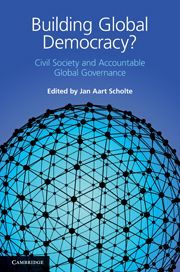Crossref Citations
This Book has been
cited by the following publications. This list is generated based on data provided by Crossref.
Tallberg, Jonas
and
Uhlin, Anders
2011.
Global Democracy.
p.
210.
2011.
Publications Received.
Contemporary Sociology: A Journal of Reviews,
Vol. 40,
Issue. 6,
p.
785.
Koenig-Archibugi, Mathias
2011.
Global Democracy.
p.
160.
Squatrito, Theresa
2012.
Opening the Doors to the WTO Dispute Settlement: State Preferences on NGO Access as Amici.
Swiss Political Science Review,
Vol. 18,
Issue. 2,
p.
175.
Powless, Ben
2012.
An Indigenous Movement to Confront Climate Change.
Globalizations,
Vol. 9,
Issue. 3,
p.
411.
Hulme, David
and
Wilkinson, Rorden
2012.
Brave New World: Global Development Goals after 2015.
SSRN Electronic Journal,
Guastaferro, Barbara
and
Moschella, Manuela
2012.
The EU, the IMF, and the Representative Turn: Addressing the Challenge of Legitimacy.
Swiss Political Science Review,
Vol. 18,
Issue. 2,
p.
199.
Hüller, Thorsten
2012.
On Infeasibilities of Cosmopolitan Democracy – Lessons from the European Union.
Swiss Political Science Review,
Vol. 18,
Issue. 2,
p.
249.
Scholte, Jan Aart
2012.
Poor people in rich countries: the roles of global governance.
Global Social Policy,
Vol. 12,
Issue. 1,
p.
3.
Davies, Thomas Richard
2012.
International Development Policy: Aid, Emerging Economies and Global Policies.
p.
48.
Take, Ingo
2012.
Legitimacy in Global Governance: International, Transnational and Private Institutions Compared.
Swiss Political Science Review,
Vol. 18,
Issue. 2,
p.
220.
Basok, Tanya
and
Piper, Nicola
2012.
Management Versus Rights: Women's Migration and Global Governance in Latin America and the Caribbean.
Feminist Economics,
Vol. 18,
Issue. 2,
p.
35.
Tallberg, Jonas
Sommerer, Thomas
Squatrito, Theresa
and
Jönsson, Christer
2013.
Explaining the Transnational Design of International Organizations.
SSRN Electronic Journal,
Buckley, Karen
2013.
Global Civil Society: The Dialectics of Concept and Reality.
Globalizations,
Vol. 10,
Issue. 2,
p.
231.
Schneider, Steffen
and
Nullmeier, Frank
2013.
Handbuch Regierungsforschung.
p.
43.
Fioramonti, Lorenzo
and
Thümler, Ekkehard
2013.
Accountability, Democracy, and Post-growth: Civil Society Rethinking Political Economy and Finance.
Journal of Civil Society,
Vol. 9,
Issue. 2,
p.
117.
Godsäter, Andréas
2013.
Regional Environmental Governance in the Lake Victoria Region: The Role of Civil Society.
African Studies,
Vol. 72,
Issue. 1,
p.
64.
Belloni, Roberto
and
Moschella, Manuela
2013.
The IMF and civil society.
International Politics,
Vol. 50,
Issue. 4,
p.
532.
Korte, Karl-Rudolf
2013.
Handbuch Regierungsforschung.
p.
411.
Ougaard, Morten
2013.
Neo-Poulantzian Perspectives in IR and the Current Crisis.
SSRN Electronic Journal,





